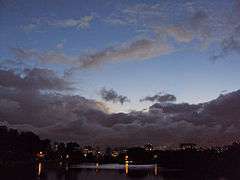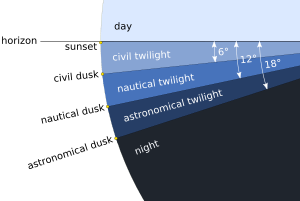Dusk

Dusk occurs at the darkest stage of twilight, or at the very end of astronomical twilight just before night.[1] Pre-dusk, during early to intermediate stages of twilight, there may be enough light in the sky under clear-sky conditions to read outdoors without artificial illumination, but at the end of civil twilight, when the earth rotates to a point at which the center of the sun is at 6° below the local horizon, artificial illumination is required to read outside.[2] "Dusk" is actually short for Astronomical Dusk, or the darkest part of twilight before night begins.
Technical definitions
The time of dusk is the moment at the very end of astronomical twilight, just before total darkness or night, or may be thought of as the darkest part of twilight.[4]
- Civil twilight, the first phase of twilight, ends when the sun is 6 degrees below the horizon in the evening. At this time objects are still distinguishable and depending on weather conditions some stars and planets may start to become visible to the naked eye.
- Nautical twilight, the second phase of twilight, ends when the sun is 12 degrees below the horizon in the evening. At this time, objects are less distinguishable, and stars and planets are becoming more brilliant.
- Astronomical twilight, the final phase of twilight, ends when the sun is 18 degrees below the horizon in the evening. At this time the sun no longer illuminates the sky, and thus no longer interferes with astronomical observations.[2]

-

Civil twilight in Porto Covo, west coast of Portugal
-
Astronomical twilight as seen from a plane window
-

View from Ibirapuera Park, São Paulo, Brazil, at Civil twilight
-
Trees silhouette dusk sky
-

Civil twilight in Albi, France
-
Nautical twilight in Vancouver, Canada
See also
References
- ↑ The Random House College Dictionary, "dusk".
- 1 2 U.S. Naval Observatory. Rise, Set, and Twilight Definitions.
- ↑ Van Flandern, T.; K. Pulkkinen (1980). "Low precision formulae for planetary positions". Astrophysical Journal Supplement Series. 31 (3). Bibcode:1979ApJS...41..391V. doi:10.1086/190623.
- ↑ "Full definition of Dusk".
